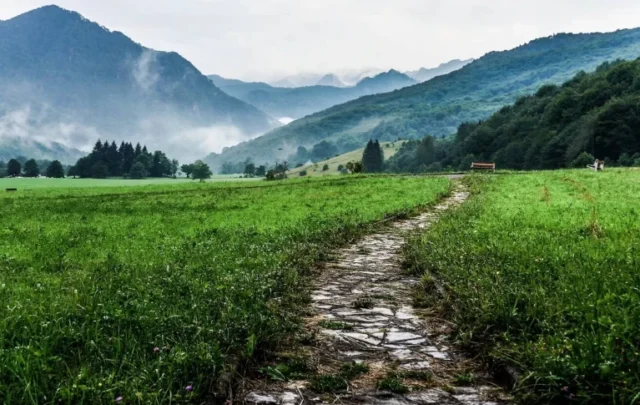This is the first post in our series by the speakers of Voices of Hope in a Time of Crises, a one-day event, which will explore localized solutions to our global problems and launch the International Alliance for Localization. Join the discussion on November 8th at The Cooper Union in New York City.
 It is a sad awareness that is becoming the zeitgeist of our time. It is being spoken in scientific, environmental, spiritual, academic, and even governmental circles. We humans may not make it much longer. The possibility of our species’ demise (along with the demise of many of the higher life forms) now permeates the thinking of thinking people everywhere. Vandana Shiva, renowned eco-activist and physicist, told an audience in Boulder that if the human species continues on its present destructive trajectory, it has no more than 100 years of life on this planet. Martin Rees, the Royal Astronomer of Britain and author of Our Final Hour, puts our chances of survival through the next century at about 50%, factoring the risks of natural catastrophes, as well as man-made disasters, such as deliberate or accidental biological or nuclear warfare. Noam Chomsky compares our destruction of the planet to the extinctions caused by an asteroid hit. We are daily barraged with news about the horrifying effects of climate chaos, and we are already witnessing the social and political instability that is likely to intensify as resources come in shorter supply.
It is a sad awareness that is becoming the zeitgeist of our time. It is being spoken in scientific, environmental, spiritual, academic, and even governmental circles. We humans may not make it much longer. The possibility of our species’ demise (along with the demise of many of the higher life forms) now permeates the thinking of thinking people everywhere. Vandana Shiva, renowned eco-activist and physicist, told an audience in Boulder that if the human species continues on its present destructive trajectory, it has no more than 100 years of life on this planet. Martin Rees, the Royal Astronomer of Britain and author of Our Final Hour, puts our chances of survival through the next century at about 50%, factoring the risks of natural catastrophes, as well as man-made disasters, such as deliberate or accidental biological or nuclear warfare. Noam Chomsky compares our destruction of the planet to the extinctions caused by an asteroid hit. We are daily barraged with news about the horrifying effects of climate chaos, and we are already witnessing the social and political instability that is likely to intensify as resources come in shorter supply.
It is depressing on a scale that is unique to our time. Even as a child, I felt that the most horrifying movies were the ones about the end of life on the planet. Now those images are playing in our heads as a real possibility, and people are feeling beaten down by them. All over the world, there are waves of distress, anxiety, and depression, which are based on circumstance and not merely on brain chemistry gone awry. Distress, anxiety, and depression are appropriate responses in facing the threat of extinction.
But, of course, while those responses are reasonable from an emotional point of view, they are contraindicated in dealing with the situation at hand. Increased panic and inner gloom only saps us of energy and clarity and more often leads to apathy, or worse, to a resigned, the-hell-with-it indulgence, quickening the gorging of resources and intensifying the pollution of land and sea.
What are more useful perspectives to get through the night here at the possible end of days? I have given this a lot of thought over the years and have had the conversation with many thousands of people in my work. Here are a few suggestions, and I would be happy to know of more along these lines.
Stay calm. It is always the first rule in emergencies and may seem trite to mention. But it is not at all trite in the lived experience and requires strong intention to maintain. Whatever you can do to induce greater quietness of heart in your life – walking in nature, meditating, playing with your dog, taking a long bath at the end of the day, reading or listening to music that fosters feelings of peace – whatever your thing is, give priority to it every day. It is from a place of peace that the most elegant solutions reveal themselves and that we do our best work. I often point out in my sessions that, were I to be scheduled for an operation on a Monday morning, I would prefer that my surgeon had been playing golf rather than fretting over my case the day before. Your relaxation and calm is not an indulgence but rather a tune up for your mental and physical wellbeing, which leads to a more awake intelligence.
Don’t indulge dark visions of the future. No matter how it seems today, know that things can turn around faster than may seem possible from our current vantage point. This is not to suggest a Pollyanna denial of the dire nature of our circumstances but rather to not assume certainty about it.
Be of service. Know that whatever is to be in the future (and, after all, longevity was never a guarantee for anyone at any time of history) it will feel good to be of service in whatever ways your gifts can be used and on any scale that feels right and true, whether in your personal life of family and friends or in the context of a larger community dealing with more global issues. There are many unsung heroes making a huge difference in the world. But there is no need to keep accounts of whether your actions will someday pay off. Being of service feels good for its own sake and gives your life meaning, a sense that you are being well used, like good compost in this wondrous field we call life. Whether we are in our last days or being forced to evolve as an intelligent world community in order to save ourselves, your own life can shine in your brief moments here and will have been a vote for the beauty and mercy of our species, no matter its outcome.
Remember that evolution is doing its thing. Most of the species that ever existed on earth are now extinct and yet here we are, hooked up and plugged in, dental flossing and watching our caloric intake, as we plan for a future that may not ultimately be in our hands.
Be in love with your life, as Jack Kerouac said. The more you love your own life, the more tenderness you will feel for all of life. You will also be more content, a quality that is given short shrift in media circles but one which is possibly the most radical of political acts. When we are content we have no need to keep adorning ourselves with objects and experiences. We extricate our attention from getting more and turn it to taking care of and appreciating what we have. We then walk more lightly on the earth.
__________________________
Catherine Ingram will be speaking at Voices of Hope in a Time of Crisis on November 8. She is the author of Passionate Presence, In the Footsteps of Gandhi, and A Crack in Everything. A former journalist specializing in issues of consciousness and activism, she has internationally led retreats and public sessions of Dharma Dialogues since 1993 and is founder and president of Living Dharma, an educational nonprofit organization.





